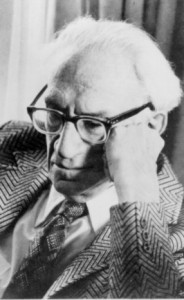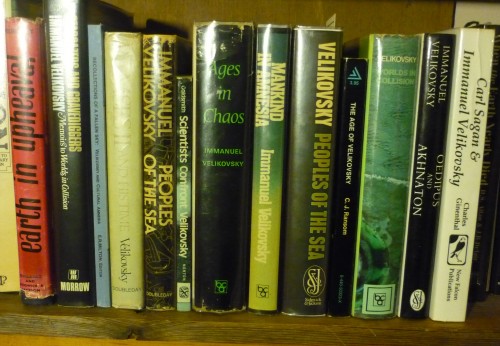 Immanuel Velikovsky, born in Vitebsk, Russia, 10 June 1895. He learned several languages as a child, graduating with full honours from Medvednikov Gymnasium, Moscow. He later studied at Montpelier, France, and Edinburgh, Scotland. At the outbreak of World War I, he returned to Moscow studying law and ancient history. He received his medical degree from Moscow University in 1921. In 1923, he married Elisheva Kramer, an accomplished violinist from Hamburg. That year they moved to Palestine, and he began medical practice. After studying in Vienna under Bleuler, a pupil of Freud’s, he began practising Psychoanalysis. In 1930, Velikovsky was the first to suggest that encephalograms would be found that would characterise epilepsy. In the summer of 1939, Velikovsky came to America to further his researches. He was one of the greatest original thinkers of the twentieth century, and his legacy continues to be the boldest, most provocative theory on the history of this earth, physical and cultural, a theory that has and will only increase in significance as time passes. If not correct in every detail, many of his ideas pass for the original work of others. “During the course of his life, Velikovsky suffered the loss of his homeland, and the family left behind as he was forced to flee Bolshevik Russia, the near extermination of his race at the hands of the Nazis, the attempted suppression of his life’s work, and savage attacks upon his character and scholarship throughout the last three decades of his life”. As he once said, ” A newly discovered truth is first attacked as being false; but when it is finally accepted as true it is attacked as not being new.”
Immanuel Velikovsky, born in Vitebsk, Russia, 10 June 1895. He learned several languages as a child, graduating with full honours from Medvednikov Gymnasium, Moscow. He later studied at Montpelier, France, and Edinburgh, Scotland. At the outbreak of World War I, he returned to Moscow studying law and ancient history. He received his medical degree from Moscow University in 1921. In 1923, he married Elisheva Kramer, an accomplished violinist from Hamburg. That year they moved to Palestine, and he began medical practice. After studying in Vienna under Bleuler, a pupil of Freud’s, he began practising Psychoanalysis. In 1930, Velikovsky was the first to suggest that encephalograms would be found that would characterise epilepsy. In the summer of 1939, Velikovsky came to America to further his researches. He was one of the greatest original thinkers of the twentieth century, and his legacy continues to be the boldest, most provocative theory on the history of this earth, physical and cultural, a theory that has and will only increase in significance as time passes. If not correct in every detail, many of his ideas pass for the original work of others. “During the course of his life, Velikovsky suffered the loss of his homeland, and the family left behind as he was forced to flee Bolshevik Russia, the near extermination of his race at the hands of the Nazis, the attempted suppression of his life’s work, and savage attacks upon his character and scholarship throughout the last three decades of his life”. As he once said, ” A newly discovered truth is first attacked as being false; but when it is finally accepted as true it is attacked as not being new.”
“He endured all this with Job-like forbearance, class and dignity. He set an example most of us can only aspire to and few will ever realise.” (Ev Cochrane) Astronomers Victor Clube and Bill Napier noted “. . Velikovsky is not so much the first of the new catastrophists . , he is the last in a line of traditional catastrophists going back to mediaeval times and probably earlier.”
Velikovsky himself used to quote Alfred North Whitehead, “If you have had your attention directed to the novelties of thought in your own lifetime, you will have observed that almost all really new ideas have a certain aspect of foolishness when they are first proposed.”
As a man of vision, he was always looking in different directions for confirmation of his intuitive ideas. “I was compelled by logic and by evidence to penetrate into many premises of the house of science. I freely admit to having repeatedly caused fires, though the candle in my hand was carried only for illumination.”
Worlds in Collision brought to public attention a world-view unrecognized except to a handful of writers over recent centuries. However unorthodox, the book was meticulously researched and referenced, at no small personal cost:
“He was humble and proud at the same time, and before all he was a great fighter who never took no for an answer; who went to the authorities of the past as well as to the great living to ask for explanations. He was never discouraged. When one of his expectations was not fulfilled, he went into the next direction to find the answers he looked for. He abandoned one way and went to the next without losing confidence in his search for what he hoped to be the solution and the truth. All in all, Immanuel was a man of a very unusual character. As I said, proud and humble, courageous, never to give up even when the odds against him and the personal attacks on him would have overwhelmed many a man. Of course, the strain showed through his life. There were times when he felt depressed as in reaction to the difficulties found in his way. And no wonder, I lived with him through very trying times and I understood when the load became too heavy” (Elisheva Velikovsky).
Dr Robert Pfeiffer, Harvard professor and author of the standard ‘Introduction to the Old Testament’, without identifying himself with Velikovsky’s conclusions, wrote in 1949, “Velikovsky discloses immense erudition and extraordinary ingenuity. He writes well and documents all his statements with the original ancient sources..if he is right, this volume (Ages in Chaos )is the greatest contribution to the investigation of ancient times ever written..I am convinced that only out of the discussion of opposite views may the truth, or an approximation thereto, be attained.” Velikovsky’s writings are notable for his copious use and respect for ancient writings, and above all, the Old Testament. In his view, should the scriptures and the academics clash, the scriptures have precedence. The alternative chronology he presented could be said to stem from an attempt to solve the following problem: the apparent insufficient correlation between Biblical history and what was surmised by archaeologists of the history of the Middle East, particularly Egypt.
Although best known for his theories on the solar system and ancient history, Velikovsky began his career in Psychoanalysis, in the days of Freud and Bleuler, who wrote, “The ideas of the author (on Psychoanalysis) appear to me very much worthy of consideration. I too, came upon very similar concepts”. Sigmund Freud also wrote to Velikovsky saying he was in complete agreement with Bleuler. It was the view of Dr Paul Federn, chairman of the Vienna Psychoanalytic Society, that Velikovsky was “a great man, a genius. I myself have sent him some of my most difficult cases.” One of the few scientists that objectively and seriously dealt with Velikovsky’s work was Albert Einstein. After moving to Princeton in the Fifties, and in the last two years of Einstein’s life the two met regularly for discussions, as recorded in ‘ Stargazers and Gravediggers: Memoirs to Worlds in Collision’.
In Mankind in amnesia Velikovsky’s theory of cosmic catastrophism found a counterpart in human psychology. “The global catastrophes of ancient times had a devastating effect on the human psyche. Collectively, mankind behaves like an amnesia victim, having lost all memory, seeks to relive the traumatic experience. Though surrounded by literary, geological and astronomical evidence of our violent heritage, we try to avoid the realization that earth-wrenching cataclysms have occurred as recently as one hundred generations ago..If the human race is not made able to face its traumatic past, the experiences that caused cultural amnesia will demand repetition.” Velikovsky believed that by studying the past, man may be assisted to learn the means to avert future nuclear disaster.
As true of all men, Velikovsky was far from infallible, but to quote Nietzche, “The errors of great men often prove more fruitful than the truths of others” and hence he remains an essential inspiration for researchers in the many areas of science and the humanities he was concerned with. “Even wrong turns can open up new vistas..but to read Velikovsky is to be catapulted into an entirely new way of viewing the world and its history.” (Ev Cochrane) He reminded us of the value of a multi-disciplinary approach, and a respect for the ancient historians seldom encountered, as well as the means to challenge established preconceptions.
“The truth of today was the heresy of yesterday“. Velikovsky died on the 17th November 1979.
Published works:
- Worlds in Collision (1950)
- Ages in Chaos (1952)
- Earth In Upheaval (1955)
- Oedipus and Akhnaton (1960)
- Peoples of the Sea (1977)
- Ramses II and His Time (1978)
- Mankind in Amnesia (1982)
- Stargazers and Gravediggers (1983)
Unpublished material available at http://www.varchive.org/
